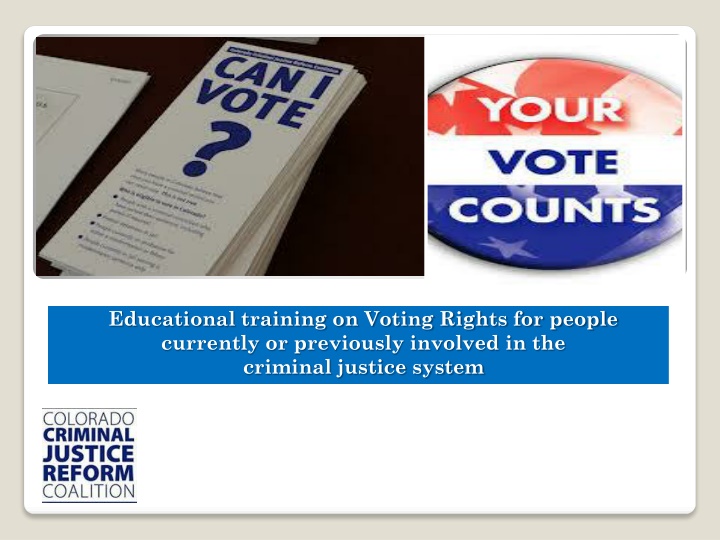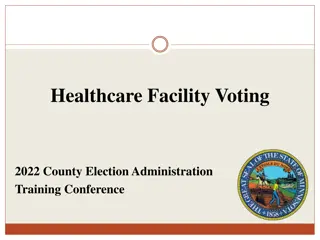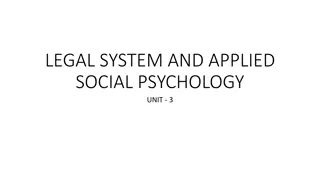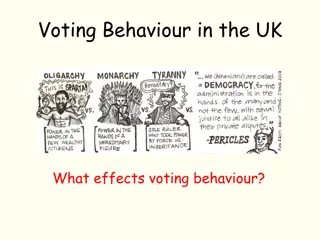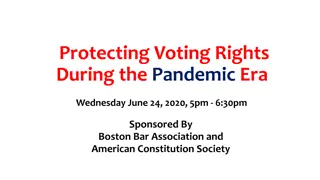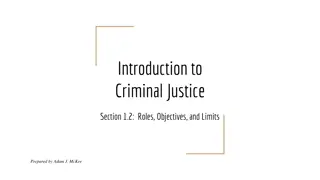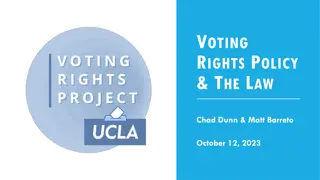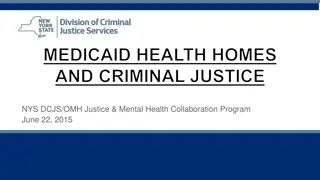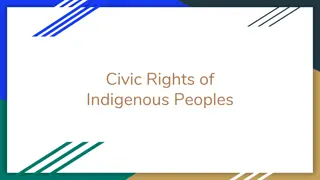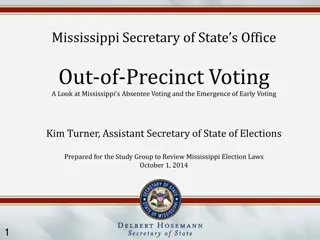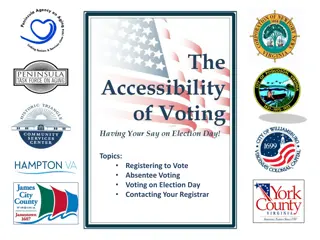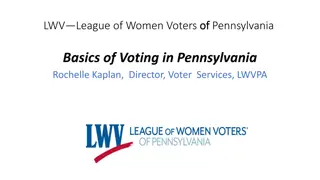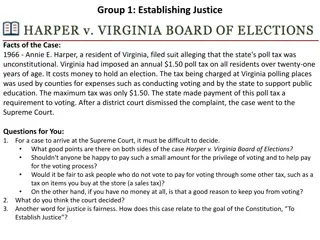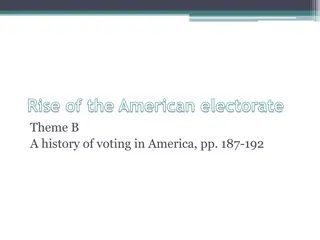Educational Training on Voting Rights for Individuals with Criminal Justice Backgrounds
This educational training focuses on voting rights for individuals currently or previously involved in the criminal justice system, specifically in Colorado. It covers the laws regarding voter eligibility for those with criminal records, the importance of understanding voting rights, and the consequences of misinformation. Participants will learn about Colorado Revised Statutes pertaining to voting eligibility and the impact of providing accurate information to prevent disenfranchisement.
Download Presentation

Please find below an Image/Link to download the presentation.
The content on the website is provided AS IS for your information and personal use only. It may not be sold, licensed, or shared on other websites without obtaining consent from the author.If you encounter any issues during the download, it is possible that the publisher has removed the file from their server.
You are allowed to download the files provided on this website for personal or commercial use, subject to the condition that they are used lawfully. All files are the property of their respective owners.
The content on the website is provided AS IS for your information and personal use only. It may not be sold, licensed, or shared on other websites without obtaining consent from the author.
E N D
Presentation Transcript
Educational training on Voting Rights for people currently or previously involved in the criminal justice system
This Training will Cover! What is the law in Colorado? CAN I VOTE ? Who can and cannot vote in Colorado if he/she has a criminal record? Why this is important?
WHAT IS THE LAW IN COLORADO The laws on voter eligibility for people with a criminal record are complicated and you need to understand the different ways people can be (or have been) involved in the criminal justice system. Even election officials may not be fully versed on this topic.
What is the law in Colorado Colorado Revised Statutes 1-2-103 (4) No person while serving a sentence of detention or confinement in a correctional facility, jail, or other location for a felony conviction or while serving a sentence of parole shall be eligible to register to vote or to vote in any election; however a confined prisoner who is awaiting trial but has not been tried shall be certified by the institutional administrator and shall be permitted to register to vote by mail registration pursuant to part 5 of this article.
There are real consequences if you tell people the wrong information!!! If you inadvertently tell someone that they are ineligible to vote but they actually areeligible to vote, you are contributing to MARGINALIZATION and DISENFRANCHISEMENT
There are real consequences if you tell people the wrong information!!! If you inadvertently tell someone that they are eligible to vote but they actually aren t, you can cause a person to get charged since it is a felony to register to vote or vote in Colorado if you are not eligible. IT IS A CLASS 5 FELONY!
There is a common misunderstanding that once a person has a criminal conviction s/he can never vote again. While this may be true in some states, it is NOT TRUE in Colorado. On any given day, there are over 125,000 adults in Colorado who are currently involved in the criminal justice system. MOST are eligible to vote. Did you know Did you know Hundreds of thousands more have a past criminal conviction. ALL OF THEM are eligible to vote. There is significant overrepresentation of people of color and low income people in the criminal justice system. Did you know Did you know THE DETAILS MATTER
The laws about disenfranch isement (denial of the right to vote) vary from state to state. Your right to vote is determined by the state in which you live. It does not matter if the person s conviction was in Colorado or another state or federal court. Key Fact KeyFact Key Fact IMPORTANT FACTS!
Who CAN vote If you are: Probation is a type of sentence that allows a person to remain in the community under supervision of a probation officer. YES you can Vote in Colorado! On Probation Then YES you can Vote in Colorado! Bond/summons is when someone has a pending criminal case but is not incarcerated. On Bond/ Summons Then
Who CAN NOT Vote If you are: Parole is a period of supervision after release from prison. In Colorado, parole is considered part of the prison sentence NO you cannot Vote in Colorado! In Prison or on Parole Then On Federal Supervised Release NO you cannot Vote in Colorado! A period of supervision following release from a federal prison. Then Living in a Halfway House NO you cannot Vote in Colorado! Community corrections(half- way house) is an alternative to jail or prison . Then
NO you CANNOT vote! YES you CAN vote! In Prison/ On Parole On Probation On Federal Supervised Release On Bond/Summons Serving a misdemeanor sentence or pre-trial detainee Serving a felony sentence Living in a Halfway House In Jail In Jail Who can and can t vote
UNCLEAR! There are other ways a person can be involved in the criminal justice system that are unclear as to his or her voting eligibility. The person should contact an elections official for clarification on eligibility!
If someone says I cant vote because I have a record The first question to ask is, Are you currently involved with the criminal justice system? If the answer is NO, then they can register to vote and vote. If the answer is YES, you will need to find out additional information about how they are involved in the criminal justice system to help them determine if they are eligible.
TREAD THIS TERRITORY RESPECTFULLY! People may be uncomfortable talking with someone they don t know about their criminal history. In order to guide someone in understanding if they are eligible to vote, you do NOT need to know the details of the case charges, etc. If people don t want to talk with you about their criminal history, offer them handouts ( like the Can I Vote? Postcard or fact sheet).
Your vote is your voice on the issues Health care Economic justice Racial justice Criminal justice Environment Children Education Any other issue important to you
Criminal Justice System Definitions Jail operated by a county or group of counties and operated by the County Sheriff (in Denver, the Director of Corrections). People can be in jail for many different reasons including: pretrial (people awaiting to post bond or not able to post-bond), people sentenced to serve a misdemeanor sentence, people awaiting transfer to other facilities or holds due to detainers from ICE or other law enforcement agencies, people incarcerated awaiting a parole, community corrections or probation revocation. Prison operated by the state Department of Corrections. People in prison are all convicted of a felony and sentenced to serve a term of incarceration in prison. Probation considered an alternative to prison sentence where a person is living in the community and is under supervision by the probation department in that judicial district. A person can be revoked from probation for not complying with all the terms of supervision and resentenced to prison. Each Judicial District in Colorado has an independent probation department and the chief probation officer is appointed by the chief judge for that judicial district. Community corrections halfway houses that includes both a residential phase where a person lives at the halfway house but is able to go out in the community for work, treatment, family visits, etc. There is also a non-residential phase where people live in their own residence but check in with the halfway house for supervision. People can be directly sentenced to a halfway house and DOC also transitions some people from prison to the halfway house while they are still considered inmates. If someone isn t compliant with the terms or rules at the halfway house, they can be resentenced to prison or returned to prison. Halfway houses in Colorado are a mix of county run, non-profit and for-profit. Parole is a period of supervision by the Department of Corrections, Division of Adult Parole people released from prison. A person can be revoked from parole for not complying with terms of supervision and can be re-incarcerated. Federal Supervised Release A period of supervision following release from a federal prison. 16
CCJRC contact information Address: 1212 Mariposa St., #6 Denver, CO 80204 phone: (303) 825-0122 email: info@ccjrc.org www.ccjrc.org
